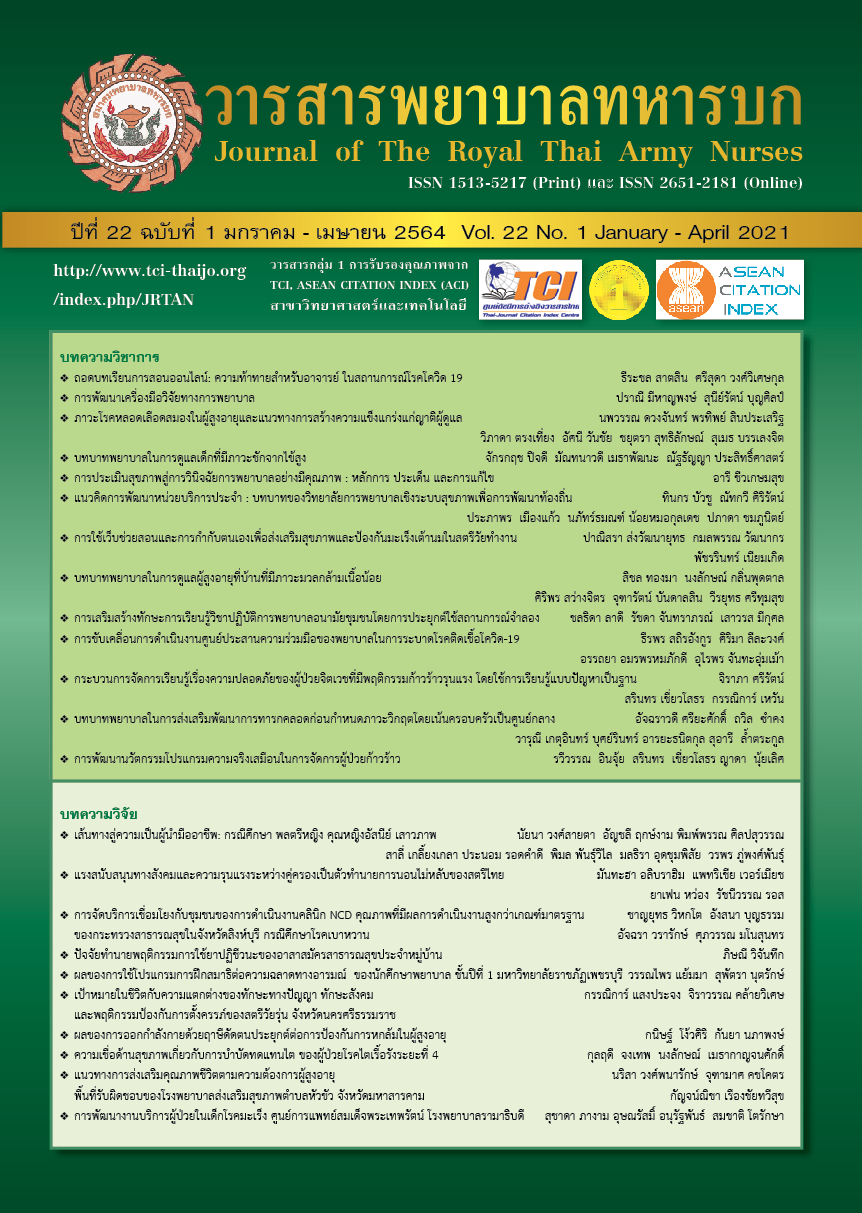Factors Influencing Tobacco Control Practice among the Registered Nurses who Used to Attending as a Leader of the Nursing Student Smoke-free Thai Society Club
Keywords:
Tobacco control practice, Register nurses, Nurse leader, Nursing student smoke-free Thai society clubAbstract
The aim of this cross-sectional descriptive study is to investigate factors influencing tobacco control practice among the registered nurses who used to attending as a leader of the nursing student smoke-free Thai society club. Theory of planed behavior of Ajzen (1991) was designed as the conceptual framework for the study. A total of 100 registered nurses who used to attending the nursing student smoke-free Thai society club were included in the study after sample random sampling method. Five parts of questionnaire was given to 100 participants by mail and the 96 responses were analyzed. Descriptive and multiple regression analysis were used for data analysis.
The research findings revealed that participants have high level of attitudes for tobacco control practice, social support, and tobacco control practice. However, they have middle level of self-efficacy. The finding showed a significant positive association of self-efficacy (p < .01), social support (p = .003), and the tobacco control practice of nurses. Moreover, nurses’ attitudes for tobacco control practice, self-efficacy and social support have explain the variance of the tobacco control practice of nurses at 25.6%. The findings have benefit for development of empowerment program for the nurse students who attending as a leader of the nursing student smoke-free Thai society club in the future. As a result, nurse students will be have excellence performance in tobacco control practice after they graduated.
Downloads
References
Thailand Nursing and Midwifery Council. Annual Report 2018 Thailand Nursing and Midwifery Council. Nonthaburi: Thailand Nursing and Midwifery Council; 2018. (in Thai)
Reangsing C. Caring for Adolescents Smoking: A Challenging Role for Nurses. Journal of The Royal Thai Army Nurses. 2013; 14(2): 17-24. (in Thai)
Thangkratok P, Langputeh A, Boonpradit P, Taiwong A, Chaimo E. Psychometric Testing of the Smoking Cessation Counseling Scale among Thai Registered Nurses. Journal of The Royal Thai Army Nurses. 2018; 19(Suppl): 50-58. (in Thai)
Nurses Network on Tobacco Control of Thailand. Report 2016-2018 Project to promote the network of teachers and nursing students in tobacco control. Bangkok: Nurses Network on Tobacco Control of Thailand; 2019. (in Thai)
Ajzen I. The theory of planned behavior. Organization Behavior and Human Decision Process. 1991; 50(2): 179-211.
Katz DA, Holman J, Johnson S, Hillis SL, Ono S, Stewart K, et al. Implementing smoking cessation guidelines for hospitalized veterans: Effects on nurse attitudes and performance. J Gen Intern Med. 2013; 28(11): 1420–1429.
Králíková E, Felbrová V, Kulovaná S, Malá K, Nohavová I, Roubíčková E, et al. Nurses’ attitudes toward intervening with smokers: Their knowledge, opinion and e-learning impact. Cent Eur J Public Health. 2016; 24(4): 272–275.
Leitlein L, Smit ES, de Vries H, Hoving C. Factors influencing Dutch practice nurses’ intention to adopt the new smoking cessation intervention. J Adv Nurs. 2012; 68(10): 2185-2194.
Choi SH, Kim YH. Factors Affecting Korean Registered Nurses’ Intention to Implement Smoking Cessation Intervention. Osong Public Health Res Perspect. 2016; 7(1): 63–70.
Jareankankai J. Factors affecting intention of breast cancer screening by Mammography of registered nurses in Rayong Province [Thesis]. Chon Buri: Burapha University; 2011. (In Thai).
Panpakdee O, Siriphittayakhunkij A, Likitluecha N, Senadisai S. A sursey of nursing practice on smoking cessation service in Thailand. Thai J Nurs. 2017; 66(1): 1-9. (In Thai).
Thitisak S, Jantorn S. Predictive factors of intention to help in smoking cessation among smokers’ family members. Thai J Nurs. 2017; 66(1): 17-24. (In Thai).
Smit ES, Hoving C, de Vries H. Determinants of practice nurses’ intention to implement a new smoking cessation intervention: the importance of attitude and innovation characteristics. J Adv Nurs. 2013; 69(12): 2665-2674.
Sarna LP, Bialous SA, Králíková E, Kmetova A, Felbrová V, Kulovaná S, et al. Tobacco cessation practices and attitudes among nurses in the Czech Republic. Cancer Nurs. 2015 Nov-Dec; 38(6): E22-9
Downloads
Published
How to Cite
Issue
Section
License
บทความหรือข้อคิดเห็นใดใดที่ปรากฏในวารสารพยาบาลทหารบกเป็นวรรณกรรมของผู้เขียน ซึ่งบรรณาธิการหรือสมาคมพยาบาลทหารบก ไม่จำเป็นต้องเห็นด้วย
บทความที่ได้รับการตีพิมพ์เป็นลิขสิทธิ์ของวารสารพยาบาลทหารบก
The ideas and opinions expressed in the Journal of The Royal Thai Army Nurses are those of the authors and not necessarily those
of the editor or Royal Thai Army Nurses Association.






